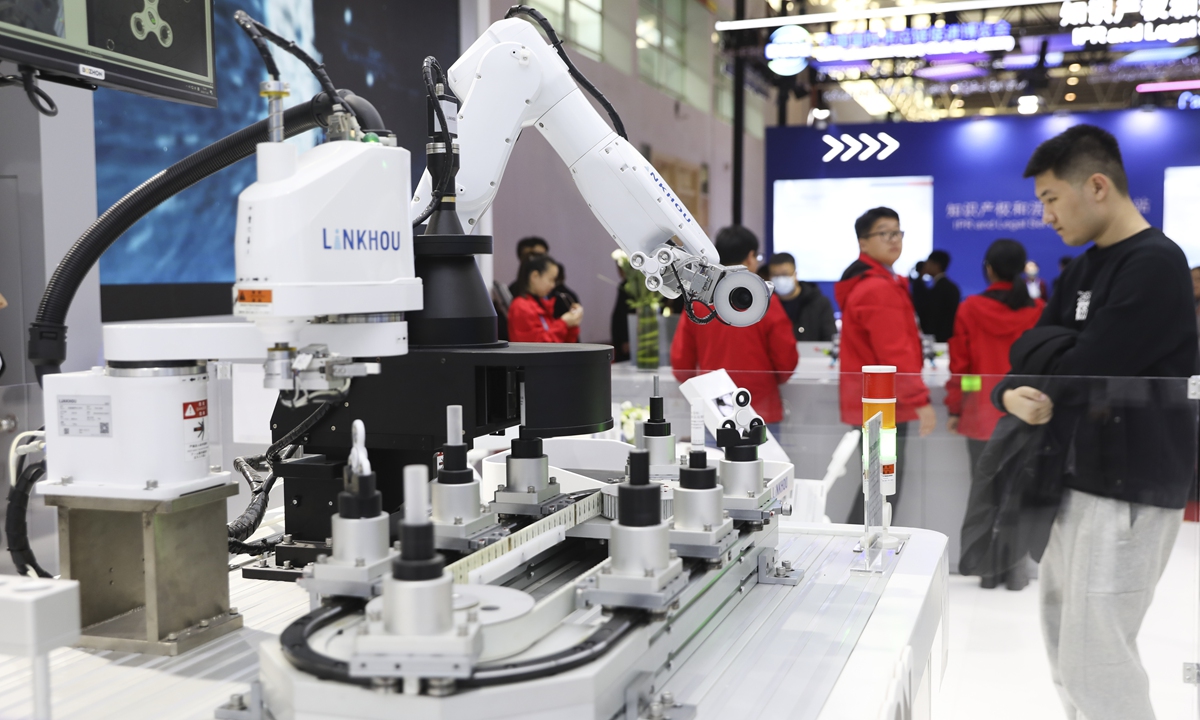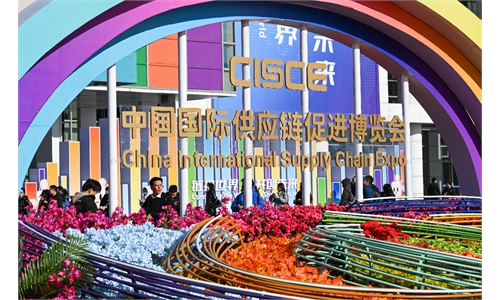US companies embrace closer business links at China's first supply chain expo, defy 'decoupling' mindset
American companies embrace closer business links, defy ‘decoupling’ mindset

A visitor looks at a robot arm displayed at the first China International Supply Chain Expo (CISCE), which kicked off in Beijing on November 28, 2023. Among the exhibitors, 26 percent are international companies, with 36 percent of that group coming from Europe and the US. Global companies from more than 50 countries and regions are participating in the event. Photo: VCG
US companies are actively participating in the ongoing China International Supply Chain Expo (CISCE), the first of its kind, which is being held in Beijing from Tuesday to Saturday. While seeking closer ties in the supply and industry chains with their Chinese business partners, they have presented their best offerings, from high-end technologies to new products and services.Industry sources said that this move again shows their determination to stay and expand in the Chinese market, while opposing "decoupling."
The expo came just over a week after the China-US summit concluded in San Francisco on November 15, 2023, where the leaders of the two countries had a candid and in-depth exchange of views on strategic, overarching and directional issues concerning China-US relations.
The meeting injected strong confidence into businesses on both sides, which is partially reflected at the expo, Zhou Mi, a senior research fellow at the Chinese Academy of International Trade and Economic Cooperation, told the Global Times on Tuesday.
Building on the significant groundwork laid by the top leaders' meeting, the five-day expo has garnered active participation by American exhibitors. According to the China Council for the Promotion of International Trade, the event organizer, US companies account for 20 percent of the total foreign participants.
Numerous industry-leading companies including Amazon, ExxonMobil, Apple, FedEx, Tesla and GE Health from the Fortune Global 500 ranks sent senior representatives to attend, demonstrating the strong appeal of the inaugural CISCE to US businesses.
A GE Health staffer surnamed Liu told the Global Times at the expo on Tuesday that the participation in CISCE is primarily meant to showcase the localization of products the company has cultivated in China over the years.
"Our production lines in China are accelerating the localization process. For instance, the localization rate of components at the Beijing production base is over 90 percent, and the localization rate for some core products is as high as 95 percent," Liu said.
The company has five major production bases in China, located in Beijing, Tianjin, Wuxi in East China's Jiangsu Province, Shanghai and Chengdu in Southwest China's Sichuan Province. There is also a factory being jointly built with Sinopharm in Shenzhen.
Having had factories in China since the 1990s, "we have represented a typical China-US collaboration," Liu said. "Simultaneously, we've assisted our Chinese suppliers in upgrading, and progressing from small to large and from China to the international market," she said.
Google is also participating in the expo. A staffer at Google's booth told the Global Times on Tuesday that the company has helped many Chinese companies go abroad, including setting up international websites and promoting them on international platforms such as YouTube.
Zheng Zhihua, representative of the American General Business Association in Beijing, is among the participants at the expo. He told the Global Times that on-site, he felt the positive engagement and communicative atmosphere of US enterprises.
US businesses are eager to invest in China, including Northwest China's Xinjiang Uygur Autonomous Region, and the expo provides them with a rare opportunity. Through the expo, American companies can further strengthen their presence in the Chinese market, Zheng said.
The CISCE involves crucial supply chains, especially in the field of technological innovation. "The participation of US companies reflects the fact that they are eager to seize these innovative opportunities and enhance their development by gaining more impetus with their Chinese partners," Zhou said.
On Monday, the US President Joe Biden announced new actions to strengthen supply chains critical to America's economic and national security, according to the statement released by the White House.
Chinese experts and business representatives said that there is more cooperation than competition in supply chain development, as reflected at the expo, urging the US to drop the "decoupling" mindset.
Despite "decoupling" voices, the Chinese expert said that among the participating US companies, many have cultivated the market in China for a long time, and their development has shown the importance they have attached to the market.
"Decoupling" from a major market and business partner - China - is not practicable, and the US companies are smart to understand the gravity of the situation, Zhou said.
Zheng also noted that certain assertions of "decoupling" between the US and China were more like political slogans, lacking practical feasibility.
"The US entrepreneurs recognize the potential in the Chinese market. Regardless of politics, they focus on doing business and making profits, given the increasing opportunities in the Chinese market," Zheng said.

